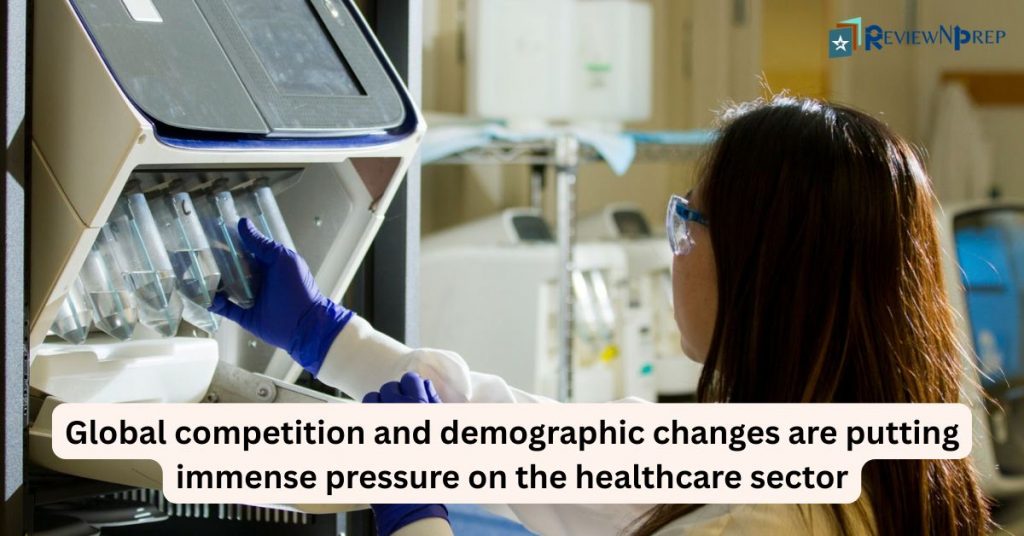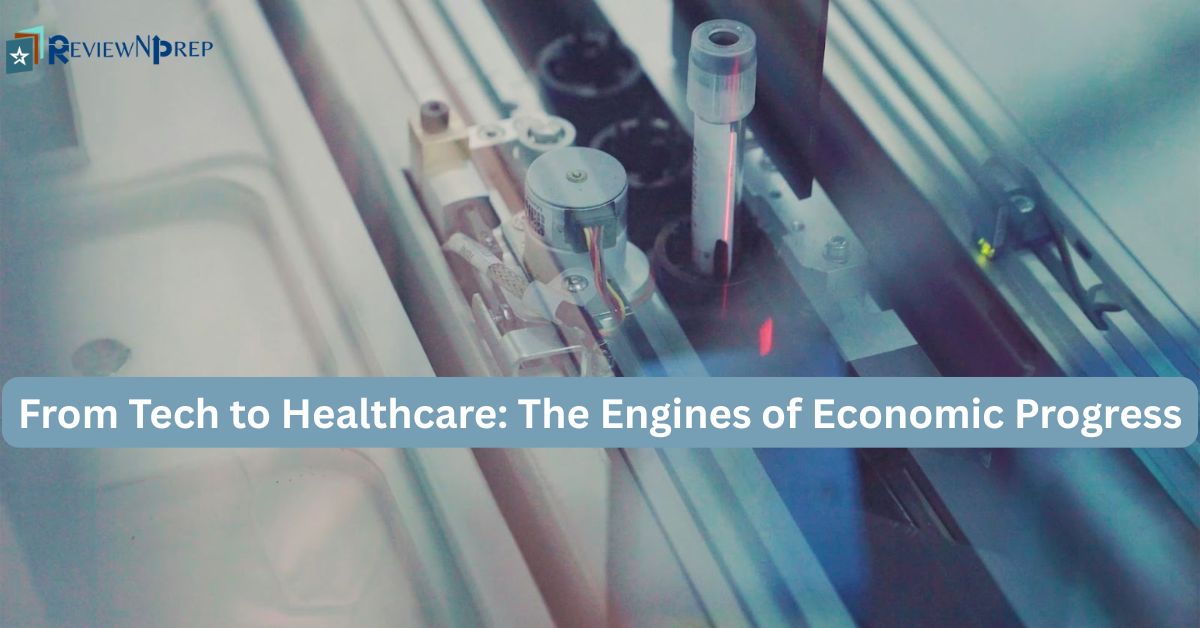How do technology and healthcare drive global competitiveness? This article explores their roles, shedding light on tech innovations that enhance efficiency and healthcare advancements that improve patient care, from tech to healthcare, exploring key sectors driving global competitiveness. Discover the key elements shaping our global economy through these vital sectors.
Key Takeaways
- Technological innovation, particularly in AI and digital health, is essential for enhancing operational efficiency and patient care in the healthcare sector.
- The healthcare industry faces significant challenges, including regulatory pressures, workforce shortages, and cybersecurity threats, which can impede its competitiveness.
- Investments in integrated healthcare technologies and strategies for addressing the needs of diverse patient populations are crucial for improving outcomes and maintaining competitive advantage.
Technological Innovation Shaping Global Markets

Emerging technologies such as blockchain, artificial intelligence, and spatial computing enhance security, decentralize data, and redefine user interactions across industries. These technologies streamline operations and mitigate risks, giving businesses a competitive edge. For example, AI and blockchain leverage technology to boost operational efficiency, speeding up processes and improving risk management across sectors.
Tech hubs like Bangalore and Singapore illustrate the global landscape of technology innovation. These regions have become epicenters for technological development, attracting investments and fostering a culture of innovation. Initiatives from institutions like National Semiconductor Translation and Innovation Centre (NSTIC) further strengthen Singapore’s position as a global leader in semiconductor research and advanced technologies.
As we look ahead, the continuous evolution of emerging technologies and technological progress will undoubtedly have profound implications for global markets, driving economic development and reshaping industries through technological developments.
Digital transformation has become a necessity in today’s business landscape. Companies that fail to adapt to these new technologies risk falling behind. Businesses must innovate to keep pace with evolving consumer expectations and remain competitive. Advanced analytics and innovative solutions are essential to create value and drive new business models in this dynamic environment, including technology solutions, business transformation, digital innovation, and digital technology. Enterprise-grade storage solutions, such as the wide temperature SSD, are also critical in supporting industries that rely on high-performance systems across challenging environments.
Healthcare Sector’s Role in Competitiveness

The healthcare sector is a cornerstone of economic development and patient care. Healthcare providers and professionals lead efforts to improve patient outcomes and deliver high-quality medical services. However, the health care sector faces significant challenges, particularly in Europe, where a decline in productivity compared to the US has sparked concerns over competitiveness.
Global competition and demographic changes are putting immense pressure on the healthcare sector. Chronic health issues are exacerbated by an aging population, necessitating innovative solutions to meet the growing demand for healthcare services. In Singapore, world-class medical advancements, such as minimally invasive procedures and treatments by Dr Thng Yongxian for gallbladder removal surgery in Singapore, demonstrate how healthcare innovation contributes to competitiveness and patient well-being.
New regulations like the EU’s medical device regulation aim to enhance consumer safety but also present challenges and opportunities for small and medium enterprises. Healthcare organizations must adapt and innovate to comply with these regulations and maintain a competitive advantage. Furthermore, climate change is projected to worsen health conditions, prompting healthcare systems to address environmental factors in their operations.
Digital Transformation in Healthcare
Digital transformation in healthcare is revolutionizing how patient care is delivered and how healthcare organizations operate. Digital technologies enable healthcare providers to enhance patient care and improve operational efficiency. One significant aspect of this transformation is the widespread adoption of electronic health records (EHRs). In the U.S., a substantial percentage of hospitals have implemented EHRs, which streamline patient information management and facilitate better coordination of care.
Telemedicine has emerged as a key component of digital healthcare, enabling remote consultations and medical advice. Patients can connect with doctors from home, making healthcare more accessible and convenient. Remote monitoring technologies enhance patient care by enabling continuous health data tracking, allowing timely interventions. Approximately 47% of healthcare organizations are already using these technologies to improve patient care and virtual health.
Cloud computing is vital in digital health, offering secure storage and sharing of patient information. This technology ensures that healthcare data is accessible to authorized personnel while maintaining high levels of security. As digital transformation accelerates, more health systems are expected to adopt these technologies to stay competitive and improve patient outcomes.
The integration of telemedicine, EHRs, and remote monitoring is reshaping healthcare delivery and enhancing patient experiences. Next, we explore how artificial intelligence is transforming healthcare and improving patient outcomes.
Artificial Intelligence in Healthcare
Artificial intelligence (AI) is a game-changer in healthcare, offering:
- Advanced analytics that improve patient outcomes and streamline services.
- Enhanced healthcare delivery by enabling precise diagnoses and personalized treatments, thus improving clinical outcomes.
- Algorithms that analyze vast patient data to identify patterns and predict disease progression, allowing early interventions through machine learning.
AI in healthcare offers several benefits:
- Automates routine administrative tasks, freeing healthcare professionals to focus more on patient care.
- Increases efficiency and reduces human error, contributing to improved patient safety.
- Significantly reduces costs by enabling early disease detection and efficient resource management.
Despite its benefits, integrating AI in healthcare presents challenges. The evolving capabilities of AI technologies pose regulatory challenges, as new policies must be developed to ensure patient safety and data privacy. Additionally, the complexity of AI algorithms can make it difficult for healthcare professionals to explain treatment decisions to patients, potentially affecting patient trust and engagement.
Despite these challenges, the potential benefits of AI in healthcare are immense. It’s crucial to explore how technology can enhance patient engagement, ensuring active participation in their healthcare journey.
Enhancing Patient Engagement with Technology
Digital health technologies revolutionize patient engagement by providing tools for active participation in healthcare decisions. Engagement strategies must cater to diverse patient segments, from health-conscious individuals to those in denial about chronic conditions. For instance, about half of U.S. adults live with at least one chronic health issue, emphasizing the need for targeted engagement in healthcare.
Addressing the needs of patients who are reluctant to acknowledge health issues is crucial for effective engagement. Innovative monitoring tools empower patients with chronic diseases to manage their health, improving treatment adherence and outcomes related to the patient’s disease, which can help improve patient engagement. For younger, indifferent patients, engaging health tools like gamification can encourage participation in health management.
Healthcare marketing should focus on building long-term relationships with patients rather than promoting single transactions. Continuous engagement and personalized care can improve patient outcomes and satisfaction.
Investment Trends in Tech and Healthcare
Investments in healthcare technology increasingly focus on integrated solutions that enhance patient outcomes and operational efficiency. Telehealth services, which gained significant traction during the pandemic, continue to attract investor interest due to their potential to transform healthcare delivery. Funding patterns show a shift towards health systems investing in technologies that facilitate remote patient monitoring and management, reflecting growing demand for digital health solutions.
Corporate venture capital significantly shapes startup innovation within the healthcare sector. Digital health platforms attract substantial funding due to their scalability and potential to offer comprehensive healthcare solutions. For instance, Singapore coworking spaces provide entrepreneurs, startups, and even healthcare tech companies with collaborative environments that foster innovation and reduce overhead costs.
When it comes to the physical infrastructure of healthcare, technology is also playing a vital role. Designing and managing complex projects like hospital buildings requires advanced digital solutions that streamline workflows, ensure compliance, and optimize collaboration between architects, engineers, and contractors. Partnering with an Autodesk Construction Cloud reseller in Singapore can help healthcare organizations leverage cutting-edge tools to create smarter, more efficient hospital facilities.
Workforce Challenges in Healthcare
The global healthcare workforce is expected to face a shortage of 10 million workers by 2030, prompting organizations to focus on retention strategies. Worker-scarce countries face both a deficiency in healthcare professionals and a high number of unfilled positions. Inadequate training opportunities, such as limited clinical placements, restrict the influx of new healthcare graduates.
Addressing the global healthcare spending workforce shortfall could significantly reduce the disease burden and enhance economic growth, with estimates suggesting a potential $1.1 trillion boost to the global economy. Technology and automation in healthcare can free up significant time for professionals, potentially creating the equivalent of two million additional workers.
Healthcare organizations face digital transformation challenges, including the need for infrastructure upgrades and staff training. Inadequate pay, poor working conditions, and excessive workloads are the root causes of healthcare worker turnover. Addressing these issues could retain 1.8 million healthcare staff, enhancing operational efficiency and patient care.
Healthcare workers commonly face several challenges, including:
- Demanding workloads
- Poor job security
- Limited career prospects
- Low motivation
- Burnout
- Attrition
Next, we explore how the regulatory environment impacts innovation and shapes the healthcare landscape.
Regulatory Environment Impacting Innovation
Regulatory environments that protect against harm and enable beneficial innovation are essential for fostering progress. The complexity of regulatory impacts on innovation is evident, as changes in regulations can lead to indirect alterations in competition and corporate strategies. Healthcare companies increasingly invest in product certification to meet new regulatory demands, indicating a shift toward compliance and innovation.
The introduction of a central European Database on Medical Devices is part of regulatory efforts to improve safety and transparency in the medical device market. To improve competitiveness, Europe needs a comprehensive strategy that includes promoting innovation in the biopharma sector.
Understanding future trends in global health systems and their impact on the healthcare landscape is crucial.
Future Trends in Global Health Systems
Patients’ expectations for health systems are increasingly influenced by their experiences in retail and finance sectors. Technology-enabled patient engagement strategies improve communication, increase access to care, and empower patients. Involving patients in their diagnosis, treatment, and recovery increases value in healthcare, according to researchers and entrepreneurs, ultimately leading to improved patient care.
Data can significantly improve patient experiences in health systems by anticipating adverse health events and enabling timely interventions. Around 90% of health system executives believe that digital technologies, big data, and clinical data will have a profound impact on their organizations by 2025, highlighting the importance of embracing these advancements.
Cybersecurity plays a crucial role in strengthening healthcare technology development plans and ensuring patient welfare. Next, we discuss strategies for navigating market changes and maintaining competitiveness in a dynamic environment.
Strategies for Navigating Market Changes
Successful healthcare organizations develop competitive strategies that enable effective responses to changing market conditions. Adapting to technological advancements and evolving consumer preferences is vital for maintaining relevance and competitiveness. Health system leaders are prioritizing efficiency and productivity improvements, with over 70% of executives aiming to enhance operational efficiencies by 2025.
A unique value proposition is crucial for healthcare providers to differentiate themselves in a crowded market. Continually assessing marketing performance helps organizations identify areas for improvement and maximize effectiveness. These strategies not only help reduce costs but also provide valuable insights into new business models, value creation, and future trends.
Healthcare organizations must remain agile and innovative amid evolving market dynamics. Next, we explore the long-term implications for global competitiveness and how these strategies can drive sustainable growth.
Long-term Implications for Global Competitiveness
Sustainability initiatives in healthcare are critical, as the sector contributes up to 5.2% of global greenhouse gas emissions. Addressing environmental sustainability is vital for global health and offers a competitive advantage in an increasingly eco-conscious market. Algorithmic biases in AI can lead to inequities in healthcare outcomes, especially if training data lacks diversity. Designing AI systems with diverse data sets is crucial for equitable health outcomes.
Maintaining human agency and well-being in design is vital for sustainable innovation as technology advances. Patient advocacy ensures that tech solutions and technical solutions meet patient needs, provide feedback on usability, and foster trust. New international cooperation mechanisms are needed to address the global implications of advanced technologies, ensuring innovations benefit all populations.
Addressing these long-term implications can enhance global health systems and drive economic development. As we move to the final section, we will summarize the key points and inspire readers with a forward-looking statement.
Summary
In summary, the intersection of technology and healthcare is pivotal in driving global competitiveness. Technological innovations such as AI, blockchain, and telemedicine are transforming industries and enhancing patient care. The healthcare sector, despite facing challenges, plays a crucial role in economic development and improving patient outcomes. Digital transformation, AI integration, and enhanced patient engagement are reshaping the healthcare landscape, making it more efficient and patient-centric.
As we navigate the complexities of cybersecurity, investment trends, workforce challenges, and regulatory environments, it is clear that a strategic approach is essential for maintaining competitiveness. By embracing future trends and addressing long-term implications, healthcare organizations can ensure sustainable growth and contribute to global health and economic prosperity. Let us move forward with a commitment to innovation and excellence in healthcare.
Further Reading:
Staying healthy – mentally and physically is importance for software engineers more than ever.
Tips for Using Health Supplements to Manage Stress in Your Career

